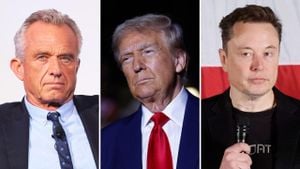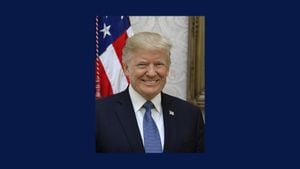The recent formation of the Department of Government Efficiency (DOGE) has sparked significant interest and reactions from both sides of the political aisle. Headed by tech giants Elon Musk and Vivek Ramaswamy, this newly minted agency was announced as part of Donald Trump's latest governmental maneuvering. With the ambitious goal of slashing federal spending and restructuring government bureaucracy, DOGE seeks to implement drastic reductions across various federal agencies.
Underlining the quirky nature of its creation, the acronym DOGE itself is derived from the meme-centered cryptocurrency, reflecting the unconventional branding many associate with Musk. This gives DOGE not just bureaucratic weight, but marketing pizzazz as it embarks on its mission. The initial vision outlined by Musk and Ramaswamy promises savings of up to $2 trillion from the federal budget, which stands at $6.75 trillion. This ambition, no doubt, raises eyebrows about the practicality and feasibility of such expansive claims.
But how realistic is it to expect $2 trillion to materialize from budget cuts? Musk has claimed bureaucratic inefficiencies lead to the bulk of excess spending, yet specifics about which programs would face elimination remain vague. Critics note the reality is more complicated—federal salaries alone amount to roughly $800 billion, and many other mandatory programs like Social Security and Medicare contribute significantly to federal spending.
The reactions from Congress have been varied, with some Democrats scoffing at the idea of Greene taking charge of such oversight. Alexandria Ocasio-Cortez humorously dubbed working alongside Marjorie Taylor Greene as akin to having “an unplugged controller.” Her mockery highlights the skepticism surrounding Greene's qualifications, and raises questions over the seriousness of the DOGE initiative itself.
Greene's new role as chair of the Oversight Subcommittee means she will have formal oversight over DOGE as its initiatives take shape. This pairing of Greene's political antics with the billionaire ambitions of Musk and Ramaswamy only serves to amplify the sense of absurdity lurking beneath the surface of this initiative. Since entering Congress, Greene has garnered attention primarily for her controversial statements and strong support of far-right issues, leading many to question how much substantive work she will bring to the role.
Alongside the humor, there's serious concern among critics about the potential consequences of the austerity measures proposed by DOGE. Some analysts have pointed out the similarities between what Musk and Ramaswamy promote and austerity measures previously enacted by other countries, such as Argentina, which triggered economic instability and increased poverty rates.
Among these radical proposals is Ramaswamy's suggestion to eliminate federal programs lacking formal legal authorization for appropriations. Such actions could greatly affect veterans' health care services, which are considered untouchable by many politicians on both sides of the aisles. Ramaswamy's plans have sparked alarm, as veterans' programs often have wide bipartisan support.
The intellectual underpinnings of DOGE seem to hinge significantly on bypassing traditional legislative avenues, which Musk and Ramaswamy suggest could be accomplished through executive actions once Trump is inaugurated. They aim to utilize presidential authority to cut spending without congressional approval—this approach echoes previous controversies from Nixon's administration, where unilateral action led to significant political fallout. Such reliance on executive power raises pressing questions about the scope of authority and accountability within the executive office.
The first cuts to federal regulations are touted to combat inefficiencies, reflecting Musk's and Ramaswamy's convictions about the need for streamlined governmental functions. The op-ed pieces they authored argue for determining how many employees are genuinely necessary for agencies to function adequately, citing the need for “minimum” staffing numbers. They express intentions to work closely with appointed staff within agencies, employing their business strategy skills to optimize government functionality.
This approach, heavily reliant on both Musk's and Ramaswamy's previous corporate experiences, leaves many wondering whether practical knowledge of running large organizations translates effectively to public sectors bogged down by bureaucracy and red tape. Given their outsider status, questions remain about the effectiveness and consequences of their prospective reforms.
Critics across the political spectrum consistently highlight the dangers of these approaches, pointing to historical examples where drastic spending cuts led to negative socio-economic repercussions. The clear skepticism directed at Greene’s competency and overall desirability for her role fosters apprehension about whether the objectives of DOGE can truly be realized or if they are merely wishful thinking.
Confusion about the role and objectives of DOGE grows, with some commentators portraying it less as a genuine oversight mechanism and more as performative governance aimed at generating headlines. The pairing of Greene with entrepreneurial mavericks like Musk and Ramaswamy is set to attract attention, yet whether it translates to effective policy is still up for debate.
One thing is clear: the buzz surrounding DOGE is less about functionality and more about the personalities involved. Musk’s penchant for spectacle mixed with Ramaswamy's unabashed populism indicates this is likely to be more of a show than serious government reform. Whether this venture can effectively engage with the complex realities of government operations remains questionable.
It remains to be seen what fruit this collaboration between these often-controversial figures will bear. Grassroots sentiments continue to coalesce around skepticism toward DOGE’s potential impact. The future administration will be watched closely, as many await the substantive reforms—or the lack thereof—that could emerge from this ensemble of bold visionaries. With each move, the progressive-oriented backlash is sure to escalate, driven by deep-seated concerns over government downsizing initiatives and their real-life impacts on everyday citizens.
With controversy brewing and plans hastily laid out, the audacious promise of DOGE may very well lead to ramifications rippling through the political fabric of America.



